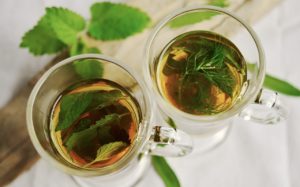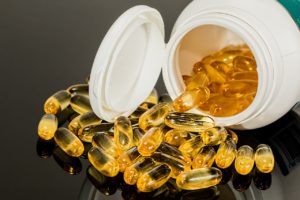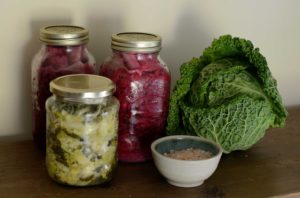Anxiety: 7 Herbs and 6 Supplements to Calm the Mind
It is normal to have anxiety in certain situations from time to time such as with public speaking or when on a job interview. It becomes a concern when it starts to interfere with your everyday activities and relationships with other people. While there can be many root causes for anxiety, while you are trying to find out what those root causes are and begin to address them, herbs and supplements can offer a welcome support.
If a supplement helps you, you need to ask why? Are you deficient in this nutrient and again, why are you deficient? Work with a holistic professional to help you get to the very root of the anxiety.
Herbs are a bit different. Herbs can be thought of as helping the body to return to a place of homeostasis. The herb does not necessarily do the work for you, but supports the part of the body that was not functioning properly and helps that body system get back to doing it’s job.
There are numerous natural remedies you can try to ease your anxiety. Always let your doctors know about your supplements and especially if you are on any medications and/or are pregnant. Speak with your practitioner before adding in any new supplements as they may interact with your medications.
Don’t try everything on this list at one time! Try one supplement or herb to see how your body reacts to it. Give it time such as a month and if you do not see any results then discontinue usage and try something else. Not everything will work for you. So if it works for your friend, it doesn’t mean it will work for you-remember our root causes are different.
7 Herbs to Ease Anxiety
While there are many more herbs than the 7 listed here, these are well known and effective herbs that should not be difficult to find.
(this is a picture of lemon balm below. While not talked about here, it is another great herb for anxiety and depression)
Ginkgo Biloba: it has shown to be significantly more effective than a placebo for reducing anxiety. It can be useful if you aniety is combined iwht depresion and if you also have concentration issues. Speak to your doctor prior to use if you are on blood thinners. If you are prone to headaches, this can make them worse or increase frequency. Dose: 240 mg. to 480 mg of Ginkgo extract for 4 weeks.
California Poppy: use this at low doses for anxiety as at high doses it is best for pain and insomnia. If using at high doses, do not drive due to its sedating effect. California poppy can have an enhanced effect when used in combination with passionflower, chamomile and lemon balm. Dose: .5-1 ml. of tincture 4 times per day.
Kava: many studies document the benefits of this herb for mild to moderate anxiety. It is not sedating. Do not take if you have liver disease. It is rapidly absorbed and thus can take effect quickly. That being said, it may take using it a few times to get the full benefit from Kava. Kava can also be used 30- 60 minutes before bedtime if you have difficulty sleeping due to a racing and anioius mind. Dose: 3-5 ml of tincture 3 times per day. Some people also like to use Kava root in a tea. I think it tastes awful but that’s me….Or use in dried root at 200 mg.
Passion flower: this has been shown to be as effective as an anxiolytic drug for general anxiety disorder. It is known to be useful for nervous tenstion, and when you feel restlessness and stress and anziety from overwork and feeling of being overwhelmed. It should be noted that because it is a gently herb, this one is best combined with other herbs for anxiety (even though I said to try one at a time!). It is synergistic with Kava and might be best to use Passion flower in combination with Kava. Dose: 3-5 ml. in tincture 3 times per day. You can use 1 teaspoon in hot water for a tea three times daily or use in whole herb extract capsules. This herb is safe to take up to three times daily as needed. It is a gentle herb so can be one to use with young children and the elderly.
Valerian: this will help to decrease restlessness and can improve sleep. This herb is best used when getting ready for bed and to slow down a racing and anxious mind. Do not use this her when driinvg. All herbs work differently for different people. I say this becauses I know some people who love valerian to help with sleep. For others, it can keep them up all night! Dose: 400-900 mg. per day of whole valerian. This is often combined with lemon balm for an increased affect.
Rhodiola: this promotes calmness. Rhodiola is considered an adaptogen which helps the body to adapt to stress of daily life. It also optimizes the immune system and hormonal balance. Dose: 500 mg. in a.m. on empty stomach of 3% standardized extract.
Ashwagandha: this is another herb in the Adaptogenic herb family. Taking 450 mg. in the morning can aid with energy, alertness and help you adapt to stress and anxiety. Taking another 450 mg. before bedtime can aid for a restful night sleep. For some, it may take a month before you notice the benefit so be patient because this is a wonderful Adaptogenic herb for anxiety and for supporting the adrenals during times of stress.
Note: If you have issues with alcohol, avoid tinctures and get in capsule/dried herb form instead. It may be best to avoid Kava if you are a heavy drinker.
6 Vitamins/Minerals to Help with Anxiety
Magnesium: a deficiency is associated with anxiety. The average U.S. diet only provides 40% of our magnesium needs. Because of our depleted soil, even the best eaters can be deficient in this master mineral. Dose: I like magnesium l threonate as this has the ability to raise magnesium levels in the brain. The bottle may also be labeled as Magtein. Follow directions on the bottle. In addition to that, continue to eat magnesium rich foods such as pumpkin seeds, spinach, black beans, avocado and almonds
B Vitamins: these offer stress support and can improve anxiety. Take a B complex to get all the B vitamins that you need. Stress and anxiety will use up your B vitamins so it is best to supplement this in addition to getting your B vitamins from food sources. Dose: Depending on the brand and amount of B’s in the product, take two capsules per day and if under a great deal of stress take 2 capsules 2 times per day. It is water soluble so you can’t over do it on the B vitamins. If you are a vegan or vegetarian, you may also benefit from additional B12 support as B12 is only bioavailable for us via meat, poultry and fish. Work with someone who can recommend a good B vitamin for you that has the B vitamins in bio-available forms. Many B supplements have cheap forms that you may not absorb. So while it may say it is providing you with over 100% of the daily value, you may be only absorbing a very small fraction of that. Combine this with gut related issues and you may just be wasting your money. I personally like Thorne or Emerald Labs brand.
Probiotics: many animal studies demonstrate the benefit for anxiety. Probiotics will help to replenish the good bacteria in the microbiome. Having a healthy microbiome is critical for mental well being. It has been shown that our neurotransmitters originate in the gut and travel to the brain via the vagus nerve. So if you want your GABA (your calming neurotransmitter) to be at optimal levels, you need to support your gut health. Dose: In order to get the full benefits choose a multi strain probiotic and take one that has 20-50 billion organism. Best results when taken with food. I personally like Mega Spore and use this one personally and with my clients. Add in fermented foods as well.
Omega 3 Fats: low DHA intake is associated with anxiety. Studies show that low Omega 3 intake is associated with higher rates of anxiety, depression and other mood disorders. In countries where higher amounts of fatty fish is consumed, there are lower rates of depression and anxiety. Dose: 1-2 g. per day of a fish or krill oil with high DHA. Do not dose fish oil over 5 grams. Work with a professional who can guide you as to how long you need to stay at a therapeutic dose and when you can reduce the gram amount. For more info on DHA/EPA go to http://trufoodsnutrition.com/5095-2/
Lactium: this supplement contains a peptide similar to protein that is naturally found in dairy products. Studies have shown that it can reduce stress induced anxiety. It does this by supporting the GABA receptors in the brain. It can also be useful if the anxiety impacts your sleep. Dose: From lactium.com, it advises to start with 150 mg per day for one month. Use 300 mg. for 2 weeks for faster action during a particular period of anxiety and stress. Use 600 mg. per day as needed, say for example, one day before an exam and on the exam day for immediate action. Lactium can be difficult to find. In the US you can try using the Life Extension Brand. For outside the US, go to www.lactium.com to find products in other countries.
GABA: there is some debate over the use of GABA. Some say that if GABA is effective for your anxiety then it means you have a leaky BBB (blood brain barrier). Until I have more research, I recommend Source Naturals GABA Calm. Your local health food store should carry this brand. Ideally you want to support your gut health so that your own body can produce the GABA that you need but in the short term, you may benefit from a GABA supplement. Food sources to support GABA include green tea, fermented foods, almonds, broccoli, spinach, oats and walnuts.
Other Tips to Help Ease Anxiety
- Avoid or greatly reduce the amount of caffeine you consume (reduce slowly to avoid headaches) Try green tea instead. This has less caffeine but also has stress reducing L Theanine in it.
- Eliminate sugars, refined carbs
- Eat more protein and healthy fats
- Eat high fiber non-starchy vegetables
- IBS and low blood sugar are associated with panic attacks
- There is a connection between a healthy digestive tract and anxiety-fix digestive issues to support a calm mind
- Include fermented foods in your diet
- Anxiety can be associated with a copper/zinc balance with copper being too high and zinc levels being too low. (ask your nutritionist to do a zinc tally test with you)
- For herbal support you can start out by trying teas that include a variety of the herbs mentioned above. Look for teas that say calm mind, stress reduction etc.…Sleepy time teas also contain some of these herbs as they help to calm the mind to help you sleep. (even though you may want to try one herb at a time to see how you react, many herbs that are used for anxiety have a synergistic effect and can work well together). I create blends for my clients and I have been told my “calm blend” has worked better than medications!
- For situational anxiety such as during test taking or public speaking, Rescue Remedy may be helpful. It comes in a spray, lozenge or gum.
Bottom Line
If you do not address root causes, these are not much better than medications as symptom management (except not addictive and none of the side effects). If your anxiety is interfering with your life, work with someone who can help you. There are many root causes for anxiety, such as low blood sugar, food sensitivities, thyroid issues, head injuries, systemic inflammation, contraceptive use and much more. In addition to that, there are other compatible supportive therapies such as EMDR (if related to something that happened in your past), EFT (aka tapping), nuero-feedback or nuero-sculpting to name a few.
Sources:
Bauman, E. & Friedlander, J. (2014) Therapeutic Nutrition. Pengrove, CA: Bauman College.
Bongiorno, P. (2015) Put the Anxiety behind you. CA: Canari Press
Challem, J. (2007) The Food-Mood Solution. NJ: John Wiley & Sons, Inc.
Haas, E. & Levin, B.(2006) Staying Healthy with Nutrition. CA: Celestial Arts
Mars, B.(2007) The Desktop Guide To Herbal Medicine. CA: Basic Health Publications
Walsh, W. (2014) Nutrient Power. NY, NY: Sky Horse Publishing
https://www.psychologytoday.com/blog/in-the-zone/201201/anxiety-and-omega-3-fatty-acids
http://ajp.psychiatryonline.org/doi/full/10.1176/ajp.2006.163.6.969
If you are sick and tired of feeling sick, tired, fatigued, depressed, anxious and more and have given up hope then Karen’s simple, effective, individualized and sustainable approach may be what you need.
Karen Brennan, MSW, CNC, Board Certified in Holistic Nutrition and Herbalist is the author of Tru Foods Depression Free Nutrition Guide; How Food Supplements and herbs can be used to lift your mood and If Life is So Good, Then Why AM I Still Depressed? Discover the root cause for your depression and learn what to do to feel better and owner of Tru Foods Nutrition Services, LLC.
For more information visit www.trufoodsnutrition.com
Want more information, like her fb page here
As a nutrition professional, Karen does not treat, cure nor diagnose. This information is for educational purposes only.





Leave A Comment
You must be logged in to post a comment.